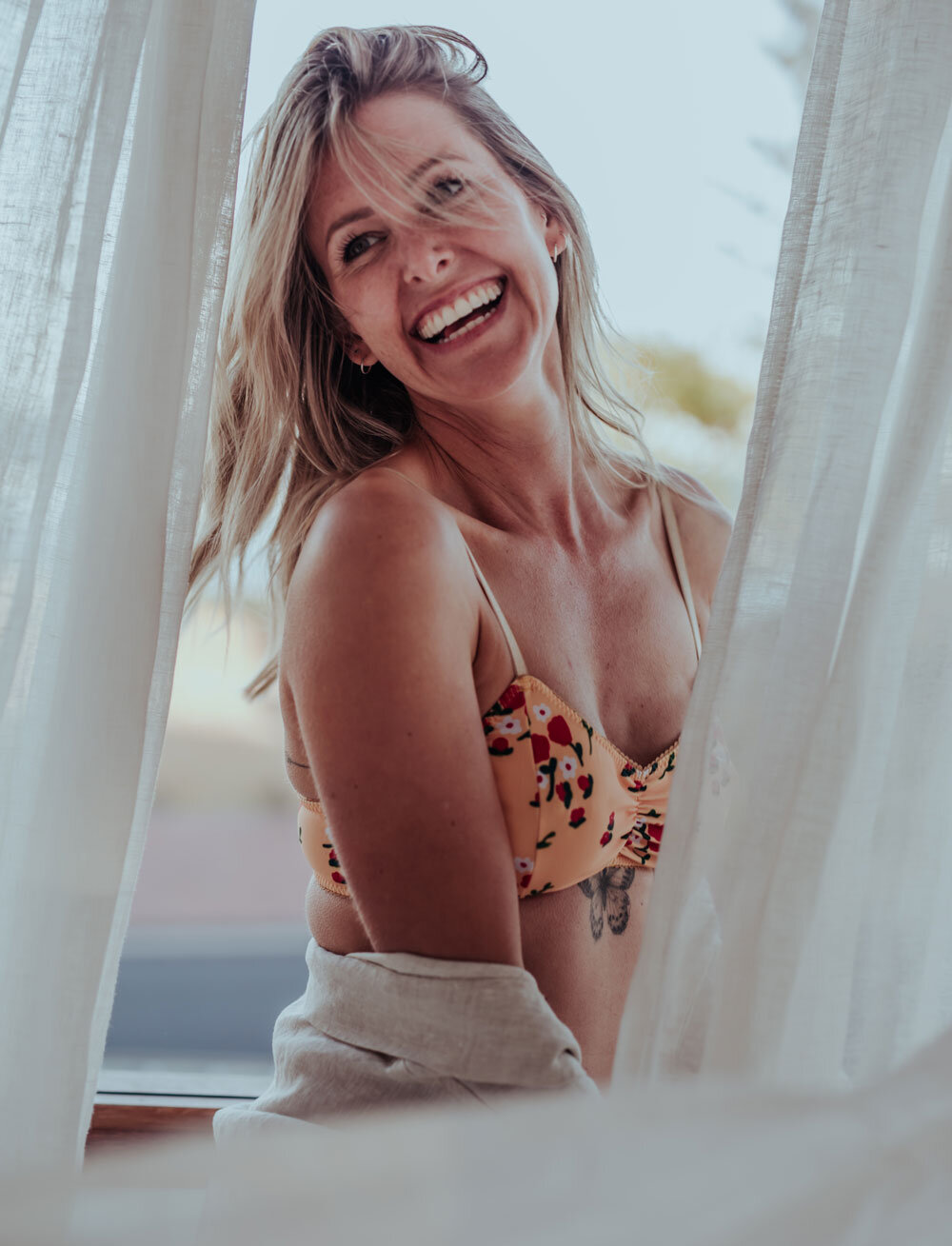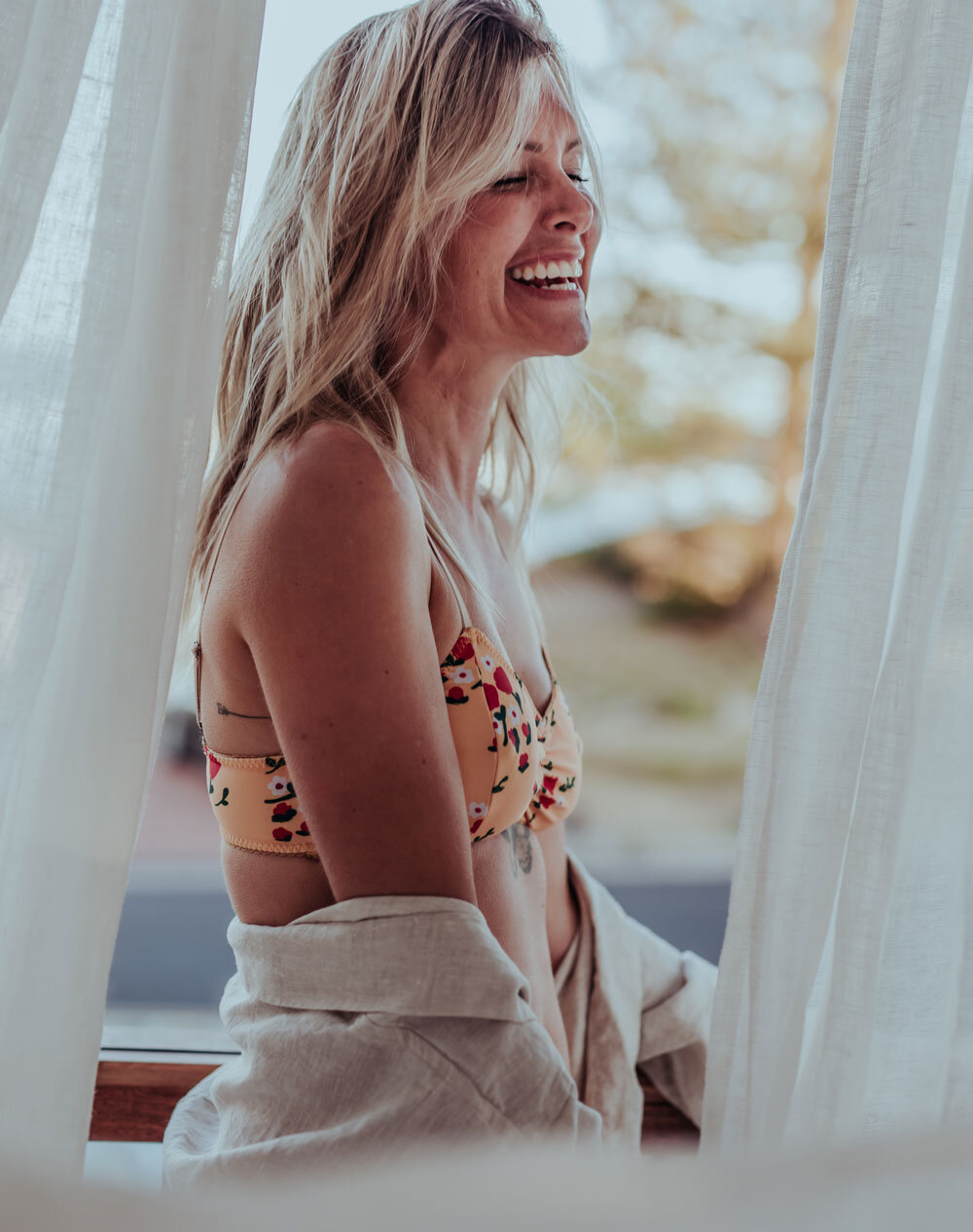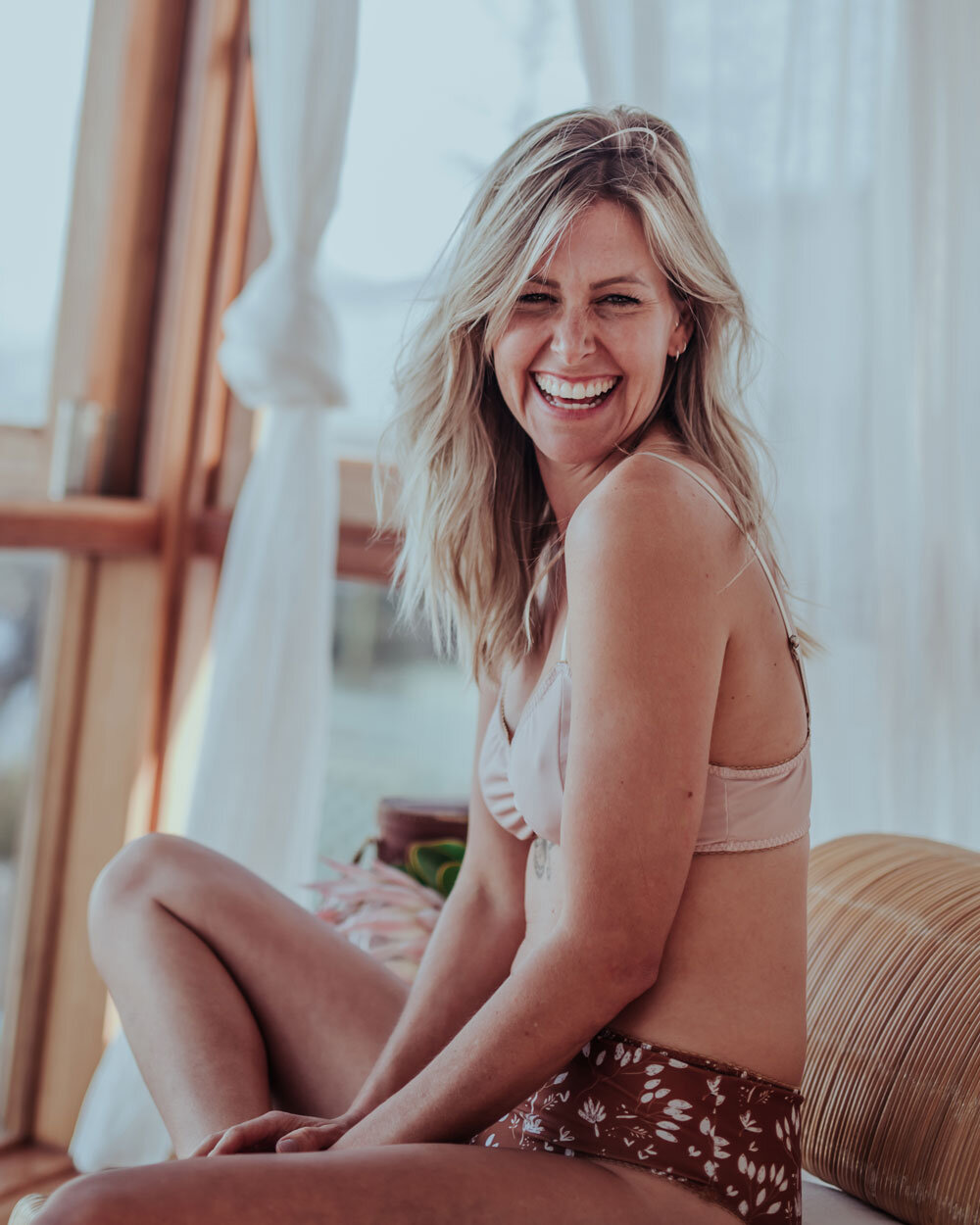The diagnosis that inspired a self-care revolution
Imagery Emma Wise // @emmawisephotography
Words: Emma Vidgen // @emma_vee
Nuni Wellness founder Dayle Larter in Bimby and Roy / Emma Wise Photography
When was the last time you touched your breasts; like really connected with them beyond putting on a bra or during foreplay/sex or maybe breast feeding?
If you’re anything like us, the answer may be a little scary. Despite spending excessive amounts of energy worrying about how quickly they’re growing (or not) as teens, most of us become weirdly disconnected from our chest as we grow into adulthood. They just kind of, hang there. Often, they’re not given much thought beyond how much (or little) daylight they see via your fashion choices.
Like us, Dayle Larter, the woman behind breast oil brand Nuni Wellness, never gave her boobs a great deal of thought. “I never really felt defined by my boobs at all,” Dayle says. “I was never like a, ‘Here are my boobs’ kind-of-girl. They were never that big or impressive anyway,” she laughs.
But an out-of-the-blue phone call one fateful morning from the Genetic Council in her home state of Tasmania changed everything – how often Dayle thought about her chest, how she thought about her chest, and even her choices around family, children and career.
Here, she talks to The Wayward about the diagnosis that inspired her to launch Nuni Wellness, a new self-care brand dedicated to helping women reconnect with their breasts and improve early detection of breast cancer.
Nuni Wellness founder Dayle Larter in Bimby and Roy / Emma Wise Photography
TELL US ABOUT THE PHONE CALL THAT CHANGED YOUR LIFE?
It was weird with us. It's not common, but it was traced back through our family and we were contacted by the Genetic Council of Tasmania because they had been working on family trees. All things pointed back to my Nan who carried it. She had breast cancer when she was 39, so I think they were studying relatives and then tracing how the BRCA gene was manifesting in this family tree. Nan had seven children, so they were all contacted and told that they should get the test – my dad was one of those so then I was contacted to take the test too.
WHAT EXACTLY IS THE BRCA2 GENE?
The risk of developing breast cancer with the BRCA2 gene mutation is between 50 to 85 per cent lifetime risk, whereas the population risk is around 14 per cent, currently around one in seven.Interestingly gene faults are only to blame for around 10% of all breast cancers, meaning that the large majority of women who contract the disease have no reason to believe they are at risk.
WHAT WENT THROUGH YOUR HEAD WHEN YOU RECEIVED THE NEWS?
I think it messed with my head a lot to start with because I felt a bit more like a sitting duck. I spoke to a lot of different doctors with different opinions about how to proceed, whether to get a preventative mastectomy etc. After a while, I came to a happy place where I thought, ‘Yes I've got this genetic risk, but there are things we can do about it and I'm not being diagnosed with cancer.’ Compared to being diagnosed with cancer and having to go through all this treatment, I felt very lucky. I wasn’t unwell.
“After a while, I came to a
happy place… I felt very lucky.
I wasn’t unwell.”
HOW DID IT IMPACT ON YOUR DECISION TO START A FAMILY?
When I met my husband Josh I kind of knew that I wanted to have babies and didn't want to muck around for ten years. I got advice about it from the Peter MacCallum Cancer Institute in Melbourne and the specialist said, “You know what? It's kind of weighing up one unknown against another. If you have a baby naturally, might not get the gene anyway." We had the choice of doing IVF so we could undergo genetic testing on the embryo but we decided to just go with it and do testing on them when they're older.
We decided that's where he was at as well, so we tried to make a baby, which took a while. I'm really glad to have had my two babies when I did. I breastfed Reuben and then something in me was just like, “You need to do it [a preventative mastectomy] now.” Now I can look at whatever I need to do next. Boobs are one thing, but the ovaries are still in there and they probably need to be looked into a bit more closely as my risk of ovarian cancer is higher with the gene too.
HOW DID YOUR experience INSPIRE YOU TO CREATE NUNI WELLNESS?
After my mastectomy, I started thinking about developing the scar serum because I couldn't find anything that was beautiful and natural and effective that I actually wanted to put on my skin to address the huge under boob scars that I had.
I just wasn't cool with the fact that another oil in the market, which is known as the go-to scar oil, is full of petroleum and fragrance. It's a chemical storm, to be honest, and not something that you want to be using at any time, but especially not when you're pregnant or when you just had breast surgery. But that was what the breast surgeon and plastic surgeon recommended. That was kind of all there was.
HOW DID YOU DEVELOP THE FORMULA?
I’d always loved that whole natural skin care realm so I went and spoke to people at skin care places and formula developers in Sydney, and started working with them to create the formula. It was so important to me it was going to tick all the boxes in terms of being natural, but still being able to preserve its integrity and efficacy of the oils and that so it's all potent and beautiful and non-allergenic and good for people who are pregnant – all of those things.
DID YOU PLAY GUINEA PIG WHEN YOU WERE DEVELOPING THE FORMULA?
I was trying it on myself sceptical, I just did it on one side. And still to this day, I've only used it on one side. So I've got quite a deep red lumpy scar on one side, and the other side is like beige and flat. It's like a before and after picture!
WHAT ARE SOME OF THE ESSENTIAL OILS IN THE SCAR OIL AND BOOB OIL?
The scar serums got all of the most coveted skin healing oils that can help to regenerate damaged skin tissue and then some of the carrier oils help to draw those essential oils deeper into the skin layers, so you're getting really deep healing.
Oils like frankincense and myrrh and lavender – lavender is like the best kind of skin healer. It was actually discovered that it was so good for burns and that sort of thing, so any skin damage. It's beautiful and it's gentle, as well. Then the carrier oils like jojoba and rose hip. This scar serum's like the most rich orange colour and you only need a couple of drops.
WHAT INSPIRED THE BOOB OIL?
The boob oil came about just naturally as a result of thinking, "Ok, breast care. What tools can we create to help women start a breast care ritual themselves?" It's all well and good to say check your boobs, but to have a beautiful luxe serum to pop on after your shower each morning and just take a moment to massage your boobs. It's not just checking in monthly, it's like daily or every couple of days giving them a massage because they're so full of lymph nodes. It's an area that requires fresh circulation to be pumped into in order for them to stay at their optimal health.
BEYOND LUMP DETECTION AND AWARENESS, WHY IS BREAST CARE IMPORTANT?
I really love this movement of women getting more in touch with like their body and their cycle because it answers so many questions about how or why we might be feeling a certain way. Breast care is the same thing; connecting with our breasts in a non-sexual way is empowering. They are so sexualised from such a young age. I remember being a teenager and being so fixated on when they’re going to grow, or boys teasing because they weren’t big enough.
I hope it becomes more mainstream that we are attuning to ourselves in that way and bringing up daughters that don't have to be retaught these things because it's with them as they grow up. I make sure I rub the oil into my boobs in front of daughter Evie and make it seem so common place like I moisturise my legs.






